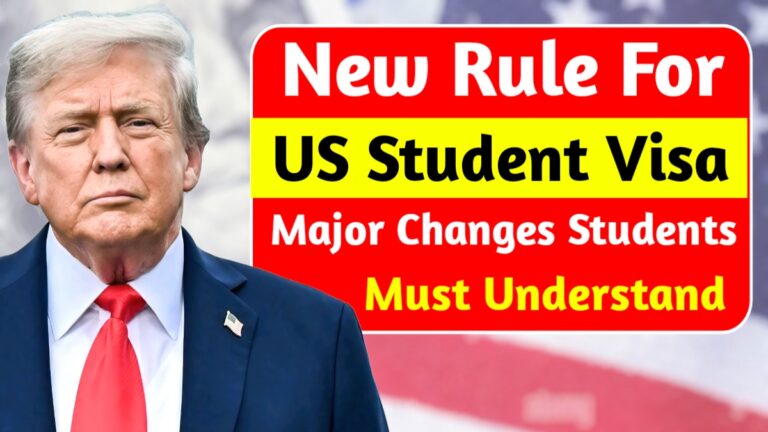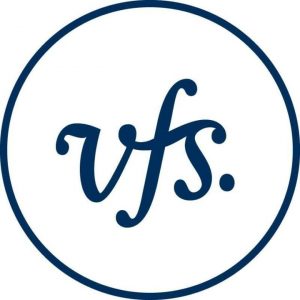New Rule for US Student Visas: The United States has introduced a new set of student visa rules that will apply to all applicants seeking F-1, M-1, and J-1 visas from 2025. These revisions are designed to strengthen documentation checks, tighten visa screening, and ensure that international students meet updated financial and academic standards before entering the country. The new US student visa rules for 2025 matter because thousands of students from India and around the world rely on these visas to pursue higher education in American universities and training institutions. With stricter monitoring and enhanced verification, students planning to apply in the coming year must prepare early and ensure full compliance with the updated guidelines.
The updates focus on financial proof, interview screening, SEVIS reporting, and program-linked visa validity. Officials aim to reduce fraudulent submissions, improve transparency, and enhance security at consulates. For Indian students who form one of the largest international student groups in the US, these changes could impact timelines, documentation requirements, and the overall visa approval process. As the 2025 admission cycle approaches, understanding these new regulations is essential for smoother applications and reduced chances of administrative delays or visa refusals.
Higher Financial Proof Requirements
The updated US student visa rules for 2025 introduce tougher financial proof requirements for F-1, M-1, and J-1 visa-seekers. Students now must show verified funding for tuition, accommodation, travel, and potential emergencies for the complete duration of their academic program. Bank statements, fixed deposits, scholarship records, and sponsor evidence will be examined more closely to ensure that the applicant has adequate and reliable financial support. This step was introduced to minimize the number of students facing financial stress after reaching the US, a concern raised repeatedly by universities and immigration authorities.
Additionally, officials have announced that consulates will cross-check financial documents more thoroughly with banks and sponsoring institutions. Any mismatch, missing record, or unverified deposit may lead to extended administrative processing or even refusal. Applicants are therefore encouraged to prepare genuine and up-to-date financial statements at least a few months before the visa interview. Many experts suggest that students should maintain consistent balances and avoid sudden large deposits, as these often attract further questioning during the verification process.
Stricter Interview Screening and Background Checks
Another major change under the new US student visa rules for 2025 is the enhanced interview and background screening process. Visa officers will now place greater emphasis on academic intention, home-country ties, financial capability, and long-term plans. Students must clearly demonstrate why they selected a particular course, how it fits into their career goals, and how they plan to return home after completing their studies. These checks aim to identify applicants who may attempt to misuse the student visa category for long-term stay or undocumented work.
Officers may also ask more detailed questions about sponsorship arrangements, previous studies, and any gaps in academic history. Applicants with inconsistent answers, unclear goals, or weak documentation may face delays under section 221(g), resulting in additional review. To avoid complications, students should prepare thoroughly, review their DS-160 information carefully, and ensure that their answers during the interview match the details submitted in their application.
Enhanced SEVIS Monitoring and University Reporting
The SEVIS system, which tracks international students throughout their stay, has undergone significant upgrades for 2025. Universities are now required to report student activity in real time, including enrollment changes, academic struggles, early withdrawals, or extended leaves. This improvement allows immigration authorities to monitor compliance more quickly and respond immediately if a student falls out of status. With this enhanced tracking, students are expected to maintain full-time enrollment and follow all academic and academic-progress requirements without exception.
These changes mean that students must remain in close communication with their Designated School Officials (DSOs) and update them about any academic adjustments. Any delay in reporting could affect a student’s legal status in the US. The improved system also reduces the chances of unnoticed overstays or unauthorized program changes. For students, the safest approach is to follow all institutional rules, maintain accurate records, and avoid activities that could result in a SEVIS termination.
Visa Validity Now Linked More Closely to Program Duration
Under the new US student visa rules for 2025, visa validity will now be more closely aligned with the exact program end date listed by the university. Earlier, visa validity periods were often more fixed and not tied precisely to program length. Now, students may receive visa validity only for the duration of their course, including approved academic breaks. If students extend their study plan or require an additional semester, they may need to apply for an extension or submit updated academic documents to maintain legal status.
This change ensures that students maintain continuous compliance throughout their stay. It also allows consulates and universities to track student progress more effectively. Students must therefore plan their programs carefully and consult their DSOs before making changes to their academic schedule. Any delay or modification without approval could affect visa status or require additional paperwork to stay legally in the country.
Stricter Document Verification and Fraud Prevention
Document verification has become one of the most important elements in the new US student visa rules for 2025. Consulates will now use advanced tools to identify fraudulent bank records, fake admission letters, and inconsistent academic transcripts. Students are strongly advised to use only genuine documents, as even minor discrepancies may lead to extended processing. US officials have reported a rise in document-related inconsistencies, which prompted the need for stricter checks.
Because of these enhanced measures, applicants should ensure that every submitted document is verifiable and consistent across all application stages. Universities and banks may be contacted to confirm the authenticity of records. Students should avoid using unverified agents or shortcut methods that promise faster visa results, as such attempts may result in long-term consequences, including visa denial or future travel restrictions. A transparent and accurate submission process remains the best way to secure approval.
Disclaimer: This article provides general information based on available updates for 2025 student visa rules. Requirements may differ depending on the consulate, university, or individual case. Applicants should always refer to official US embassy or consulate websites for the most accurate and updated guidelines.
Stay ahead with the latest updates!
Join The Podium Media on WhatsApp for real-time news alerts, breaking stories, and exclusive content delivered straight to your phone. Don’t miss a headline — subscribe now!
Chat with Us on WhatsApp




